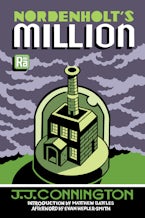"Prescient both to Hamilton's time and to the current moment of war, plague, and refugee crises, this novel deserves to be rediscovered. Readers will have much to chew on."
Publishers Weekly
“Brilliant, nuanced, and deep [….] a terrifying and prescient science fiction novel.”
ForeWord Reviews (starred review)
“Hamilton always writes forcibly, and her present novel deals with the heart-shaking effects of the next war. It might, indeed, be used as a tract to convey an awful warning. . .”
The Spectator (1922)
“Miss Hamilton has spun so finely with the intimate fibres of human emotion and thought that the whole effect is startlingly real.”
The Bookman (1922)
"Decades later, scores of novels about the aftermath of nuclear war would deploy a similar gambit; few are quite this effective."
Los Angeles Review of Books
“Terror falls from the skies, and within a few months England has become a collection of small tribes living separately and brutishly, tilling the soil and building hutments.”
The Fortnightly Review (1924)
“A particularly effective and chilling version of a theme that dominates British speculative fiction between the wars.”
Neil Barron, Anatomy of Wonder, ed.
“Hamilton is one of the first—and among the darkest—of those UK novelists whose vision of things was shaped by WWI, which they saw as foretelling the end of civilization.”
Clute and Nicholls, The Encyclopedia of Science Fiction, eds.
“Challenging last century's assumptions about the invulnerability of imperial civilization, Cicely Hamilton's 1922 novel is a grim, swift read—and an argument for pacifism as the first principle of survival.”
Nisi Shawl, Nisi Shawl, author of Everfair and co-author of Writing the Other: A Practical Approach












